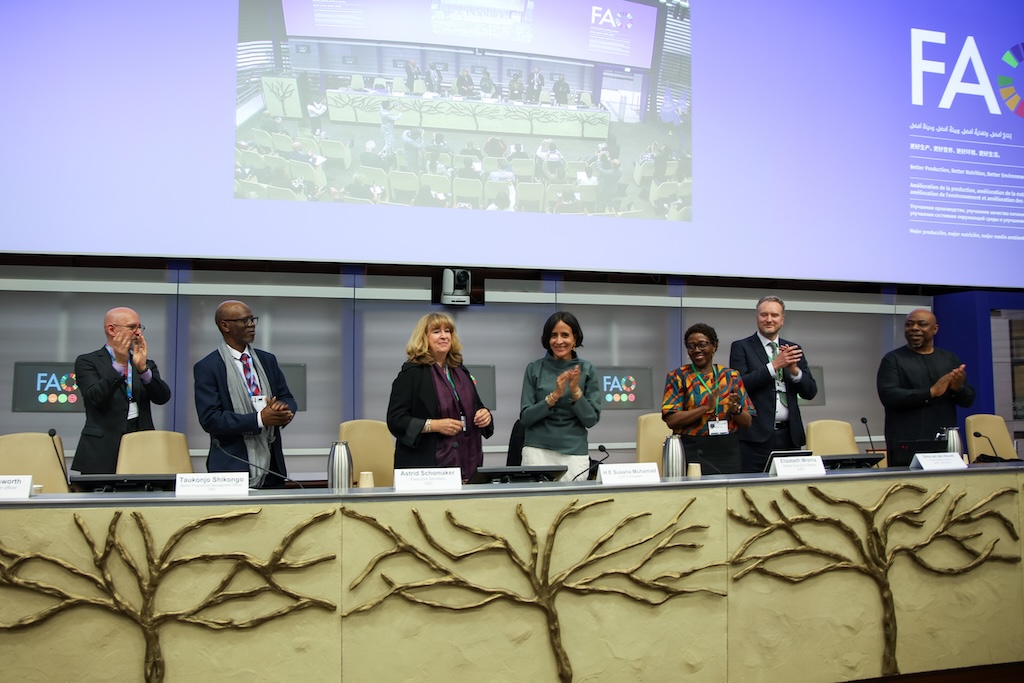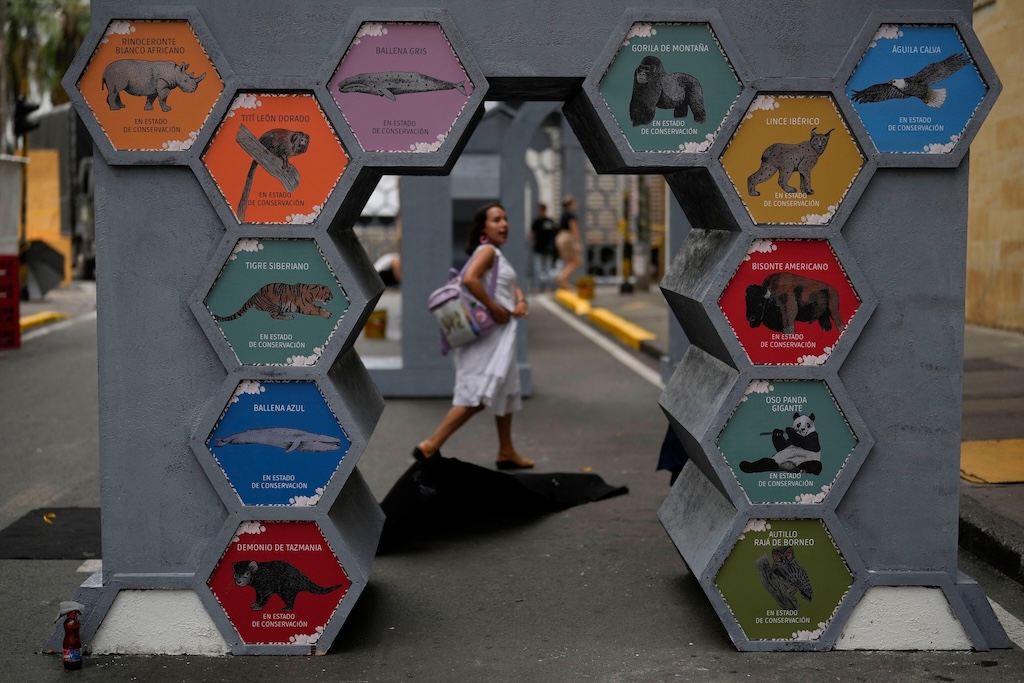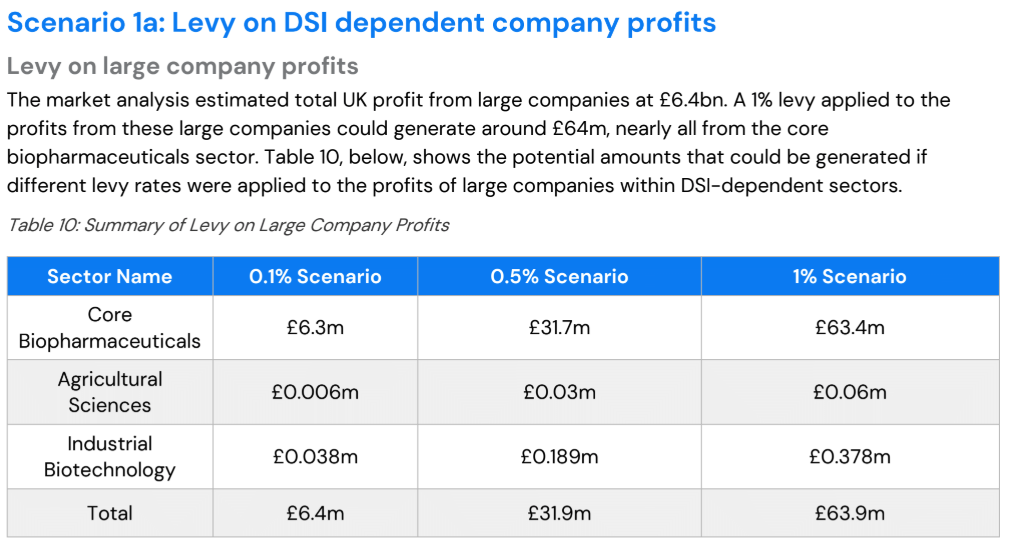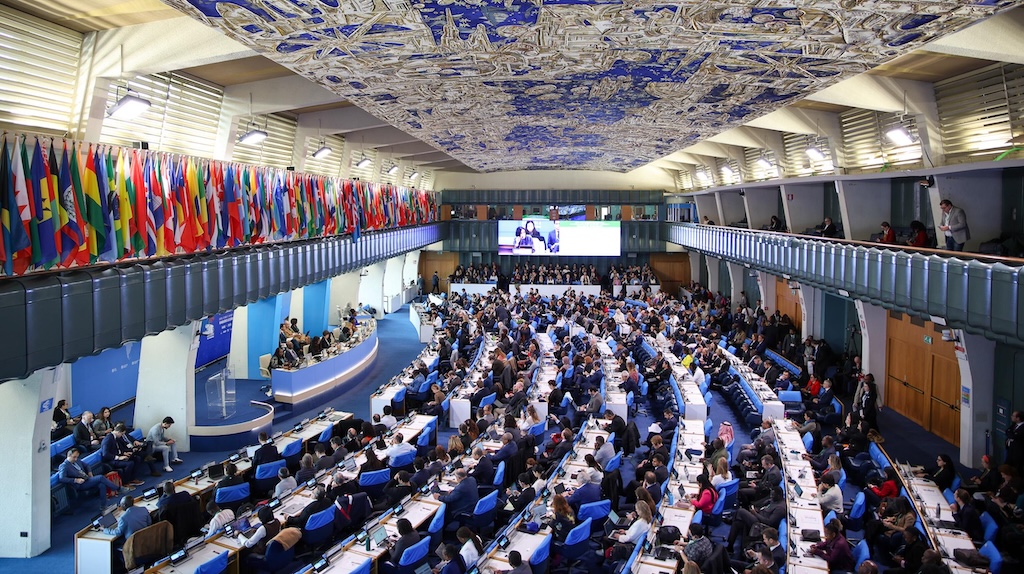Existing green growth policies are leading nowhere fast, so scientists say it’s worth exploring alternatives like degrowth to stay within planetary boundaries.
With Earth’s average annual temperature speeding toward 1.5 degrees Celsius faster than expected and global climate policy on a treadmill, an increasing number of researchers say it’s time to consider a “restorative pathway” to avoid the worst ecological and social outcomes of global warming.
New Research Explores a Restorative Climate Path for the Earth
Climate Change
Revealed: ‘Cali Fund’ for nature still empty as emails show industry hesitation
A major fund for biodiversity remains starved of resources more than five months after its launch – with no money yet put forward by the large companies who could contribute.
The “landmark” Cali Fund – which could generate billions of pounds each year – was created under the UN Convention on Biological Diversity (CBD) at the COP16 nature negotiations in Cali, Colombia last autumn.
Countries agreed that certain companies “should” pay into the fund, but this is not legally binding and donations are, ultimately, voluntary.
The fund is designed to be a way for companies who rely on nature’s genetic resources to share some of their earnings with the developing, biodiverse countries where many of the original resources are found.
Companies use genetic data from these materials to develop products, such as vaccines and skin cream.
Emails released to Carbon Brief under the UK Freedom of Information (FOI) Act show that companies were contacted with opportunities to be involved in the Cali Fund before its launch in February 2025.
Pharmaceutical giant AstraZeneca did not take up an offer from a UK government department to be a “frontrunner” in committing to donate to the fund, the emails show.
GSK, another major company in the sector, also did not confirm its position.
These are the UK’s two largest pharmaceutical companies and they could each potentially contribute tens of millions of pounds to the fund, based on current guidelines.
Earlier this year, a spokesperson for the CBD said that the first contributions to the Cali Fund could be announced in spring.
One US biotechnology company has pledged to contribute to the fund in the future, but, for now, the fund remains empty.
Company hesitancy could be “driven by industry bodies” who “don’t want unhappy precedents to be set” on the level of funding, a researcher who was involved in the fund negotiations tells Carbon Brief.
Lack of funds
Companies all around the world use genetic materials from plants, animals, bacteria and fungi to develop their products.
There are existing rules in place to secure consent and compensation, if companies or researchers physically travel to a country to gather these materials.
But, currently, much of this information is available in online databases – with few rules in place around the requirements needed for access. This genetic data is known as digital sequence information (DSI).

In an effort to close the loophole, almost every country in the world agreed in 2024 to set up the Cali Fund.
The agreement outlines that large companies in sectors including pharmaceutical, cosmetic, biotechnology, agribusiness and technology “should” contribute to the fund to share back a cut of the money they earn from the use of these materials. (See: Carbon Brief’s infographic on DSI.)
However, these contributions are voluntary. Many African and Latin American countries sought a legally binding mechanism around this issue at COP16, but this did not happen.
The fund officially opened at the resumed COP16 negotiations in Rome in February 2025.
With the fund still empty more than five months later, a spokesperson for the CBD secretariat tells Carbon Brief that a US-based biotechnology firm, Ginkgo Bioworks, is the first to “indicat[e] its intention to contribute”.
The CBD, also acting as the interim secretariat for the new fund, “continue[s] to engage with business associations to raise awareness and secure funding”, the spokesperson says.
They add that a decision-making body and a steering committee have been set up.

The CBD received “positive feedback and engagement” from companies about the fund, the UN biodiversity chief Astrid Schomaker said in a February press conference. She added that donations were expected “very soon”, but not in “massive numbers”.
Carbon Brief contacted Ginkgo Bioworks for comment, but did not receive a response in time for publication.
‘Frontrunner’ contributors
Through an FOI request, Carbon Brief received email correspondence between the UK Department for Environment, Food & Rural Affairs (Defra), major pharmaceutical companies AstraZeneca and GSK, and trade group the Association of the British Pharmaceutical Industry (ABPI) between August 2024 and April 2025. (Carbon Brief has uploaded the FOI documents it received to a Google Drive folder.)
A representative from Defra told AstraZeneca in December 2024 that they were contacting a “select number of companies that will likely be frontrunners with the Cali Fund and make contributions – leading the way for others to follow suit”.
The Defra employee said that they had received “some positive signals from these companies” and asked if AstraZeneca was interested in “demonstrating commitment in this start-up phase of the fund”. This email said:
“I hope this finds you well – and thanks for joining various calls over the last few weeks on DSI, it’s great to have you involved. I know that AZ have been really forward leaning on ABS issues in the past (including under your leadership) and now that we have the Cali Fund for benefit sharing from the use of DSI, I wondered if we might pick up the conversation on any role AZ might be able to take as an early mover in the ABS world?
“We are beginning to have conversations with a select number of companies that will likely be frontrunners with the Cali Fund, and make contributions – leading the way for others to follow suit – and we have had some positive signals. Do you think there might be any interest from AZ in demonstrating commitment in this start-up phase of the Fund? If it would be helpful to have a conversation to chat through, please do let me know and I’d be super happy to set something up.”
The AstraZeneca representative responded to say the company was “in the process of conducting an assessment to define our position” on the fund and that they would “welcome a conversation” when this concluded.
A Defra official contacted the company again in early January to say the government was preparing meetings between a member of the CBD secretariat and several businesses “that have shown some interest in leading others by making the first contributions to the fund”.
They asked if AstraZeneca was interested in attending this meeting. The company declined, but said it would be interested in future discussions.
An AstraZeneca spokesperson declined to respond to Carbon Brief’s questions, but Carbon Brief understands that the company is still reviewing its position on the fund.

Similar exchanges took place between representatives from Defra and GSK ahead of the Cali Fund launch.
GSK was invited to the same January meetings, but the company said nobody was available to attend. A Defra official contacted GSK in February to update on progress with the fund, outlining that it would be launched in Rome, “accompanied by a platform for announcements and press coverage”.
The Defra official asked GSK to let them know “if you think there might be any opportunities for GSK – we would obviously love to add your voice to the positive coverage”. The email read:
“As a broader update, we are still expecting the Fund to formally launch in Rome at COP16.2, and that will be accompanied by a platform for announcements and press coverage. We are also working with another CBD Party to explore the option of putting on some kind of reception for those businesses that are leading the way together.
“Please do let me know if you think there might be any opportunities for GSK – we would obviously love to add your voice to the positive coverage!”
They also asked if GSK would like to see a draft version of a press release from the CBD about the launch of the Cali Fund, along with other businesses “that are interested in being part of the launch”.
(The Cali Fund launch press release did not contain any quotes or donation announcements from companies.)
GSK said that it was “awaiting further clarification on a number of key elements” before making a decision on the Cali Fund and would respond “in due course”.
The company “support[s] the intent” behind the fund, a spokesperson tells Carbon Brief, adding:
“We’ll make a decision regarding voluntary contributions when more information becomes available about how the Cali Fund sits alongside other multilateral mechanisms.
“GSK was one of the first companies to publish a nature strategy and we continue to work on delivering our plan to address our nature impacts and invest in nature protection and restoration.”
A Defra spokesperson tells Carbon Brief:
“Nature underpins everything and those who profit from the use of genetic data should pay nature back. The Cali Fund provides the route for companies to do that.
“The government is committed to continuing to engage constructively with industry to drive contributions and champion the fund to protect nature and sustain innovation.”
The UK and Chile recently launched the “friends of the Cali Fund” group, which “brings together” governments and businesses to “champion” benefits sharing, a UK government statement said. Norway, Germany, the Netherlands and Colombia have also joined this group.
UK companies could contribute £64m
Contributions to the Cali Fund are voluntary. They will depend on whether companies that rely on the use of genetic data will then admit to using genetic materials and decide to pay into the fund.
The agreement behind the fund, which is not legally binding, outlined that companies “should” contribute 1% of their profits, or 0.1% of their revenue. These are an “indicative rate”.
Words that are more binding, such as “will” and “shall”, were included in non-paper negotiation texts during the talks. But the final agreement referred to a fund that companies “should” pay into, which was criticised by some experts at the time.
At least half of the money raised will go towards meeting the “self-identified” needs of Indigenous communities in developing countries, particularly women and young people.
The overall fund could generate between $1bn and $10bn each year, according to a 2024 analysis requested by the CBD.

The cache of information released under FOI to Carbon Brief also includes a report on the impacts of a mandatory payment for using digital sequence information, which was prepared for Defra by consultancy company ICF in July 2024.
It estimated that a mandatory 1% levy on the profits of large UK companies “who are considered DSI-dependent” could generate nearly £64m ($85m) for the fund.
The report compared three different benefit-sharing mechanisms around genetic data: a mandatory levy on UK profits/revenues; a flat fee; or a subscription fee.
All options would negatively impact on “innovation” to varying degrees, the report said, but a mandatory levy on profits was found to have the “least negative impact on competition and innovation”.

During the Cali Fund negotiations last October, the Guardian reported that AstraZeneca “said it may cut jobs” in the UK, if such a levy was introduced. An AstraZeneca spokesperson denied the comments, the newspaper said.
Based on the “indicative” contribution rates of 1% of profits or 0.1% of revenue, Carbon Brief estimates that AstraZeneca could potentially contribute as much as £41-66m ($54-88m) and GSK £31-35m ($41-46m) each year to the fund.
AstraZeneca reported revenue of £41bn ($54bn) and £6.6bn ($8.7bn) in profit before tax in 2024. GSK’s revenue that year was around £31bn ($40bn) and its pre-tax profit was £3.5bn ($4.6bn).
Lobbying concerns
At COP16, many observers were concerned about industry lobbying around digital sequence information.
DeSmog analysis of COP16 attendees highlighted the presence of big pharmaceutical companies, powerful industry groups and agribusiness at the talks.
The International Federation of Pharmaceutical Manufacturers and Associations (IFPMA), a global pharmaceutical trade group, said it had “serious concerns” about proposals around the fund at the start of COP16. The group said it would result in “regulatory and financial barriers that would stifle innovation, delay R&D [research and development] and complicate compliance”.
The emails obtained by Carbon Brief show that, in August 2024, a GSK representative told Defra that the company believed proposals for a “simplistic payment mechanism based on revenues would be disproportionate and could hinder the development of new medicines and vaccines”. This email said:
“You were asking for views on the call, so I also wanted to take the opportunity to share GSK’s perspective at this time. We are supportive of a practical and fair multilateral mechanism for benefit-sharing from the use of digital sequence information on genetic resources. The criteria for this mechanism listed in decision 15/9 are particularly important, specifically the fact that it must not hinder research and innovation.
“We are concerned that the current proposals for a simplistic payment mechanism based on revenues would be disproportionate and could hinder the development of new medicines and vaccines. We would support the consideration of other models, for example a subscription model whereby organisations that access open source DSI databases make a contribution to the global fund.
“This would have the benefit of broadening the base of contributors. Tiers could be established based on size of organisation, so that the contributions were proportionate and fair.”
The FOI release also shows that ABPI chief executive, Dr Richard Torbett, wrote a letter to UK nature minister Mary Creagh on 17 October 2024, a few days before the COP16 summit began.
He “urge[d]” the government to not agree on the details of a fund “until more work has been conducted to understand the implications of proposals”.
Torbett said that, if this was not possible, the ABPI wanted the government to support an option put forward by Japan and South Korea to introduce a voluntary funding mechanism.
Hesitancy potentially ‘driven by industry bodies’
In a statement after COP16, the IFPMA’s director general, Dr David Reddy, said the decision creating the Cali Fund “does not get the balance right between the intended benefits of such a mechanism and the significant costs to society and science that it has the potential to create”.
The FOI release obtained by Carbon Brief includes a 20 March 2025 document from the ABPI discussing possible future changes to the fund.
The group said the fund “contains and omits several features which make it unlikely to attract significant contributors”. The ABPI “cannot over-emphasise the importance” of the fund being voluntary, the document said, with companies “free to decide” if and how much they want to contribute.
The ABPI urged the UK to discourage any country-level implementation of the COP16 digital sequence information agreement, arguing that “conflicting” action on a national, rather than global, level would “reduce the (already weak) incentives to contribute to the Cali Fund”.
The ABPI also criticised the agreed 0.1% and 1% contribution rates for companies, saying they are “regarded by industries generally as being unrealistic and likely to impact innovation”.

The ABPI declined to respond to Carbon Brief’s questions and referred Carbon Brief to the global trade group, the IFPMA. A spokesperson for the IFPMA also declined to respond to questions and pointed towards the company’s public statements on the issue.
Dr Siva Thambisetty, an associate professor of law at the London School of Economics and Political Science and project lead on an ocean biodiversity research group, believes the first contribution to the fund is a “prize that’s just waiting to be won”. She tells Carbon Brief:
“It would be an absolute coup for a responsible DSI company to be the first to make a contribution to the Cali Fund. Investors should be very interested in that company, for instance.
“We’ve got to move to a biodiversity market where investors are asking whether companies they invest in are contributing to remedy and repair at a global level through appropriate monetary benefit sharing.”
Thambisetty believes that this is “low-hanging fruit”, but acknowledges that companies have varying opinions on the fund and that the “majority might be unsure how to deal with this”. She adds:
“I think the hesitancy is mostly being driven by industry bodies because they don’t want unhappy precedents to be set. There is a collective action problem and the first company to break cover will be sending a signal that will be received differently by different people.”
The post Revealed: ‘Cali Fund’ for nature still empty as emails show industry hesitation appeared first on Carbon Brief.
Revealed: ‘Cali Fund’ for nature still empty as emails show industry hesitation
Climate Change
Virginia’s Democratic Gubernatorial Candidate Embraces Renewables, Natural Gas and Community Planning for Data Centers
Former Congresswoman Abigail Spanberger strikes a different tone than the current Republican administration and wants to expand energy possibilities.
Former Congresswoman Abigail Spanberger is campaigning for Virginia’s governor’s race on an energy platform that supports robust renewable development and continued use, as needed, of natural gas. The former Democratic lawmaker also aims to make energy-reliant data centers pay for upgrades to the electrical grid.
Climate Change
Grand Canyon Fire Is Now the Largest Burning in the Nation
A wildfire burning since July 4 has closed the North Rim of Grand Canyon National Park for the rest of the season.
A wildfire that has closed the North Rim of Grand Canyon National Park raged out of control over the weekend and is now the largest currently burning in the country. The Dragon Bravo fire has burned more than 123,000 acres and was only 13 percent contained as of Monday afternoon, according to a federal interagency website that tracks wildfires.
-
Climate Change2 years ago
Spanish-language misinformation on renewable energy spreads online, report shows
-
Climate Change Videos2 years ago
The toxic gas flares fuelling Nigeria’s climate change – BBC News
-

 Greenhouse Gases1 year ago
Greenhouse Gases1 year ago嘉宾来稿:满足中国增长的用电需求 光伏加储能“比新建煤电更实惠”
-

 Climate Change1 year ago
Climate Change1 year ago嘉宾来稿:满足中国增长的用电需求 光伏加储能“比新建煤电更实惠”
-

 Carbon Footprint1 year ago
Carbon Footprint1 year agoUS SEC’s Climate Disclosure Rules Spur Renewed Interest in Carbon Credits
-
Climate Change2 years ago
Why airlines are perfect targets for anti-greenwashing legal action
-
Climate Change Videos2 years ago
The toxic gas flares fuelling Nigeria’s climate change – BBC News
-
Climate Change2 years ago
Some firms unaware of England’s new single-use plastic ban

















